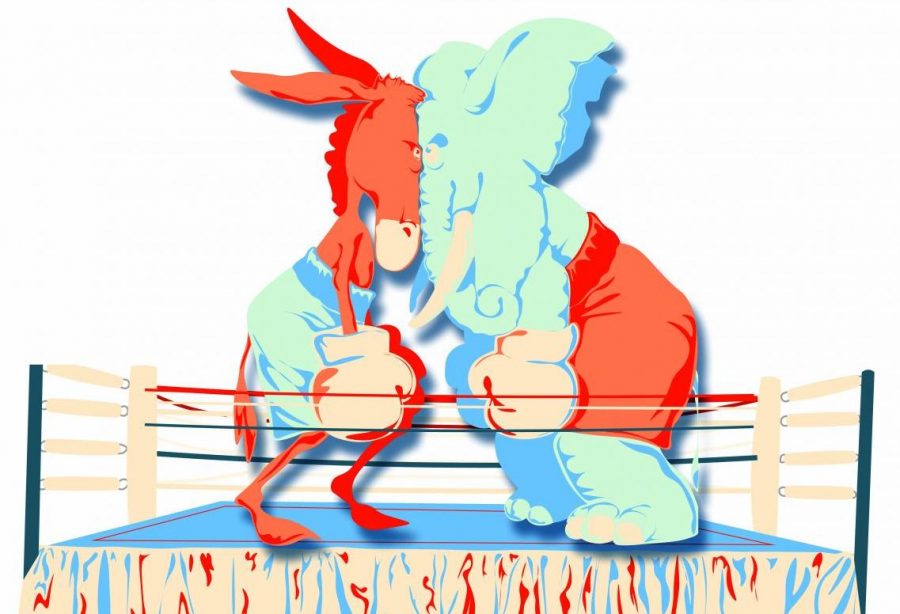Teenagers have become more active in politics in recent years, especially with the upcoming presidential election.
Rookies in the ring
Political involvement increases among students
October 30, 2020
Editor’s note: This story was included in the portfolio that was named superior in the 2021 TAJE Best of Texas contest. It also won second place for news stories in the Press Women of Texas high school journalism contest. This story also won Tops in Texas for print news writing and first place for print news writing in the ILPC contest.
Although America has a history of low voter turnout from the younger generations, students have recently become more politically engaged, especially with the upcoming presidential election. In a poll of 300 students, 78 percent of students said they’ve seen this increase, with 46 percent saying involvement increased significantly and 32 percent seeing a slight increase.
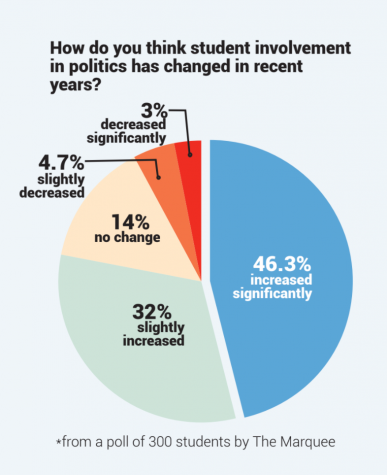
Junior Luke Dodson, who identifies as a leftist, agrees that students are more interested in politics.
“I’ve seen a much greater awareness and a much greater urge to actually do something,” Dodson said. “I think people are realizing how vital politics are to not only our future, but the people around us.”
AP Government teacher Carey Petkoff said that she began to see this shift in 2018. Before then, she said that students occasionally went to political rallies but rarely got hands-on experience.
“I had a lot of students directly involved in various campaigns and that was definitely a change from previous years,” Petkoff said. “… These kids were going out, knocking on doors, campaigning for local candidates.”
Petkoff believes that the controversial nature of President Donald Trump and his policies, as well as the media attention they illicit, are the main reason why teens and young adults are gaining an interest in politics.
“Donald Trump is anything but boring,” Petkoff said. “So I think that brings a lot of attention to it and elicits a response one way or the other.”
Topics such as climate change, college prices, BLM, gun rights and COVID-19 are major talking points in the election. Senior Carson Fisher, who considers himself left-leaning, believes that they are important to young voters.
“I think a lot of our generation is concerned about things like civil rights, whether that comes like LGBT or Black Lives Matter,” Fisher said. “Whether they’re against it or for it, I think that those are big issues, and I think also anything that has to do with the environment is also pretty big.”
The topics being discussed during the election have played an important role in helping students form their political opinions. Senior Matthew Hill, who considers himself a Conservative, believes that political topics such as gun control can motivate teens to vote for candidates they might not agree with in other ways.
“Even if their social views aren’t all that Conservative, I know a whole lot of guys who enjoy hunting and so they want Trump to win just because they don’t want gun rights to be taken away,” Hill said.
Of the 80 students old enough to register to vote, about 61 percent said they will be voting in the upcoming election. Petkoff helped 68 students register to vote this year, which is slightly lower than the 75-100 kids she gets most years. However, she believes this is because less students are on campus.
“I think the difference is that I didn’t have to try so hard to get kids to register, so they were a little bit more willing and wanted to get registered,” Petkoff said. “I had kids seek me out on their own if I missed their classroom when I was going by to register people and that does not happen.”
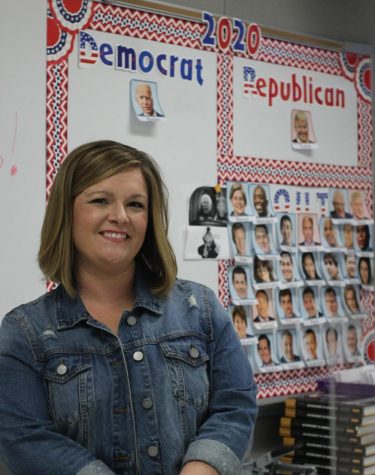
Senior Tristan Fredrick, who identifies as a Conservative, registered with Petkoff. He voted early for Donald Trump. Fredrick believes that a lot of teenagers complain about the government but don’t do their part to get their message across by voting, which he hopes more teens will do in this election.
“A lot of young people aren’t voting and getting the messages that they really support,” Fredrick said. “They’re not pushing for that and getting it, using their ability to vote to kind of get the message out and get what they want done.”
On the other hand, Fisher voted early for Joe Biden. He said that while the older generations sometimes view teenagers as lazy and apathetic when it comes to politics, he believes younger voters actually do care about America and each other, it just doesn’t transfer over to the polls. Fisher agrees that it’s up to teens to fight for the changes they want to see in the government.
“The system has been so long left to the older white male, that it doesn’t really appeal to a more diverse younger generation,” Fisher said. “So we have the perception that it’s only old people that participate, but that’s not the case. We only view it that way because we ourselves aren’t participating.”
Parent perspective
Parents can be a major influence when teens are forming political opinions. About 32 percent of students said that their political beliefs are similar to those of their parents, while about 28 percent said they are somewhat similar.
AP Government teacher Carey Petkoff said this is to be expected, as parents who are vocal about their political beliefs on either side will likely influence their kids.
“The most influence in your life is by your parents because you see politics from their point of view first,” Petkoff said. “They’re never wrong, of course, when you’re little.”
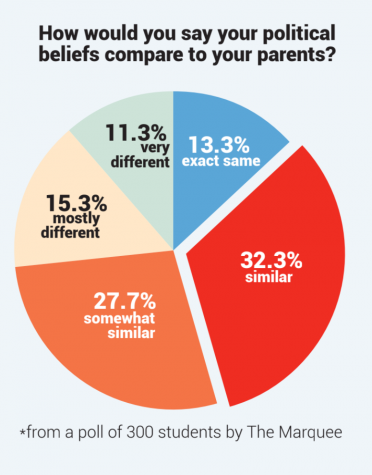
Senior Tristan Fredrick, who identifies as a Conservative, believes that his views align with those of his parents, although he has formed some of his own opinions since 2016.
“My parents are a lot of the reasons why I got into politics, but there are definitely some things that we disagree on,” Fredrick said. “Some things that I’m maybe a little more traditional on, which is kind of ironic, and then some things that maybe they’re a little more traditional on, but it’s fairly similar.”
Many students seem to follow the same path as Fredrick, forming their own opinions as they get older. About 33 percent of freshmen said that their political beliefs are the exact same as their parents, which is notably larger than the 12 percent of seniors who said the same. Senior Emma Adair, who identifies as a leftist, wasn’t surprised by the results.
“I think a lot of it has to do with maturity and the ability to kind of be on your own because I don’t think anybody really thinks the exact same things they thought when they were 14,” Adair said. “They’ve kind of grown up a little bit.”
Adair experienced this personally, as she said that she didn’t care about politics in 2016 before she began doing her own research. Her political beliefs are now different from her parents, who typically vote Conservative.
“You have to be on it yourself to try and be more informed and form your own opinion from that, because really, nobody’s going to help you,” Adair said. “If you don’t, then you’re just going to end up going along with whatever it is they said anyway.”
Division between parties
The divide between political parties is greater, leaving less Independents with the upcoming presidential election. This division is seen on campus as well. Almost the exact same percentage of students identified as Democrats and Republicans at about 23 percent. The proportion of students who considered themselves moderates on both sides was also about the same at about 11 percent.
Junior Avery Hamilton, who identifies as a Conservative, agrees that the split between political parties is becoming more clear.
“America is supposed to be about freedom,” Hamilton said. “Liberty to choose what you want, and think what you want and be able to talk about things, honestly with almost no filter… but I feel like because everybody’s so one side or another, we’re definitely becoming more divided.”
AP Government teacher Carey Petkoff has seen this divide in her classes. Petkoff said that the even split between right-leaning and left-leaning students is unique compared to her classes two years ago.
“I had a heavy skew to the liberal side,” Petkoff said. “Sometimes I do activities where we break up into segments and I’ll do the ideology split, and I almost couldn’t do it because I had so few conservative students. But this year, it’s really not like that at all. I’ve really had a 50/50 in all three of my classes.”
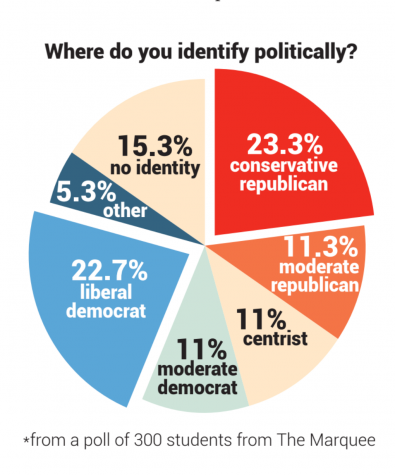
Denton County is often considered a Conservative county in a historically red state. However, studies have shown that younger voters are more likely to be left-leaning. Petkoff said this could contribute to the even split seen on campus.
“The income level plays into party politics, as does race,” Petkoff said. “If you’re living in an area like ours that is largely affluent, that has traditionally been a part of the Republican base, you’re seeing a shift all over the place on both sides now where you have folks that are making more income that are skewing to the left.”
Senior Susanna Soelberg, who identifies as a Liberal Democrat, said she was surprised by the current split between political views in the local area.
“It’s more evenly split than I would have thought,” Soelberg said. “I honestly would have thought it would be more Conservative.”
Although many students identify with one end of the political spectrum, Petkoff said that she still has a considerable amount of moderate and apolitical students. In the poll, 11 percent identified themselves as Centrists, while about 15 percent said they had no identity. Petkoff believes that being socially liberal and economically conservative is a common trend among teens.
“It’s not necessarily that you don’t identify as Democrats or Republicans, but that your viewpoint on certain issues doesn’t necessarily lend itself to like one or the other,” Petkoff said.
Senior Matthew Hill, who considers himself a Conservative, thinks that the small number of apolitical students have maintained their views since the last election.
“They don’t want to be involved because all they see is fighting, and so they don’t want to have to join either side and then fight against the other,” Hill said. “So apolitical people, I don’t think they’ve really been drawn into it. I think they’ve sat out.”
Although senior Carson Fisher said his political views align more with liberal ideas, he tries to keep a moderate stance, as he sees value in having an open mind.
“I think anyone who doesn’t listen to both sides is foolish,” Fisher said. “I think that’s an immature stance to only align yourself with one side. I think both sides have valuable opinions and valuable information.”
Effect of social media
Social media has played a major role in getting teens involved in politics in recent years. Almost 53 percent said that social media has impacted their political views in some way. Junior Luke Dodson, who identifies as a leftist, believes that social media has helped students see the big picture when it comes to politics.
“I think it’s made political involvement much more accessible,” Dodson said. “It really lets us not just get a grasp for how other people identify politically, but also be introduced to new viewpoints.”
AP Government teacher Carey Petkoff believes that social media has helped many teens develop their political opinions in a way that wasn’t available to previous generations.
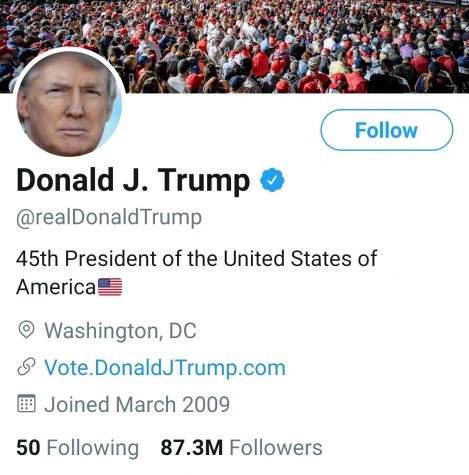
“I think it is a unique way for your generation to be able to sort of vocalize your thoughts and feelings about things,” Petkoff said. “Whereas in my generation, the internet existed, but social media wasn’t a big deal and so if you w
ere going to talk politics, then you had to have friends who wanted to talk with you, and that’s not always the case.”
Senior Tristan Fredrick, who identifies as a Conservative, said that he follows a lot of political-based accounts and discusses politics with others on social media, allowing him to consistently see political content in his feed.
“At least on social media and stuff, I was pretty active during 2016, but… I just feel like on social media, everyone shares their views now, and I think it’s good that there’s more political involvement,” Fredrick said. “I’m hoping that means there’s more young voter turnout.”
Social media usage in politics isn’t limited to teens. In recent years, politicians on both sides have been using social media to connect and interact with younger voters and supporters in a more casual setting. According to the Pew Research Center, politicians use Twitter twice as much and have three times as many followers in 2020 when compared to 2016.
This is especially true for President Donald Trump, who is known for using his Twitter account to openly share his opinion on controversial topics and political figures. He currently has over 87 million followers on the platform.
“You have all this information at your fingertips,” Petkoff said. “If you want to know what the president thinks about something, he’s constantly putting it out there. So I think it’s nice to be able to see what it is he’s thinking at any given moment.”
While social media has played a huge role in boosting teen interest in politics, it can also have a negative effect. Apps often suggest content based on a users’ interests, which can prevent users from being exposed to a wide variety of opinions. Junior Avery Hamilton, who identifies as a Conservative, also worries that false information can spread quickly on social media.
“I feel like people see stuff online and then they post out without really researching or thinking about what the actual context of the scenario was,” Hamilton said.
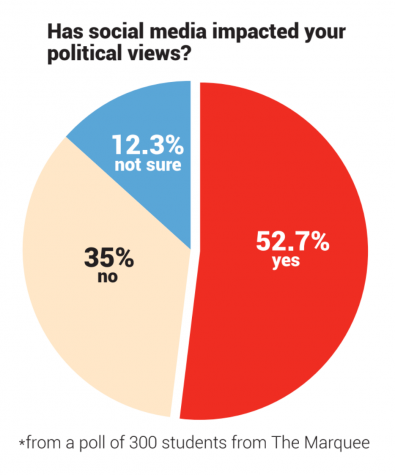
Senior Carson Fisher, who identifies as left-leaning, said that consistently seeing information on social media can persuade someone’s thinking without them realizing it. Fisher has noticed that if he gets too many TikTok videos promoting a political topic, he’ll sometimes begin to believe it, even if he does not agree with it.
“I find myself after a while believing stuff, or starting to believe stuff that I kind of snap out of and am like, ‘Wait, I know that’s not correct,’ Fisher said. “So I think it has almost a hypnotic effect without realizing it.”
Fredrick said that he is concerned that social media companies may ban people based on their political beliefs. One of his friends was banned on Twitter twice, the first time coming shortly after the 2016 election, and Fredrick believes it had to do with his Conservative content.
“I think it depends on what you’re associated with and the people you follow, but also, I think there’s a lot of tech censorship,” Fredrick said.
Petkoff said that social media has the potential to either educate teens about politics or make them resent it completely depending on how it is used.
“Sometimes it’s just too much and it’s really easy to turn it off and completely escape it,” Petkoff said. “Especially if you aren’t a regular news reader or watcher, it’s really easy to escape it and never know what’s going on. So I think it’s sort of either end of the spectrum.”

